Alison McGhee's Blog, page 2
October 1, 2016
Poem of the Week, by Philip Terman
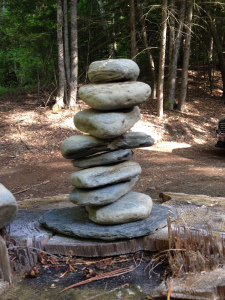 This poem makes me think of my mother and father, who, from my vantage point, seem to spend most of their time doing good things for others. Need sixty pounds of stuffing for the Octoberfeast? Sure. Need a ride to your dentist appointment sixty miles away? No problem. All-day help in the homeless shelter kitchen every third Wednesday? Of course. A listening ear in a time of sadness? They are there. They are there, they are there, they are there. Some people write checks and then there are the people like my parents, who wade in knee deep to fill the plates and then wash the plates, brew the coffee and then pour the coffee, welcome the new babies, slip a $20 in their graduation cards eighteen years later, and stand in line in dark clothes to say goodbye when the time comes. We are all headed to the same place; may as well name it Jerusalem, or Mecca, or the meaning-of-a-life-whatever-that-may-be, and step purposefully.
This poem makes me think of my mother and father, who, from my vantage point, seem to spend most of their time doing good things for others. Need sixty pounds of stuffing for the Octoberfeast? Sure. Need a ride to your dentist appointment sixty miles away? No problem. All-day help in the homeless shelter kitchen every third Wednesday? Of course. A listening ear in a time of sadness? They are there. They are there, they are there, they are there. Some people write checks and then there are the people like my parents, who wade in knee deep to fill the plates and then wash the plates, brew the coffee and then pour the coffee, welcome the new babies, slip a $20 in their graduation cards eighteen years later, and stand in line in dark clothes to say goodbye when the time comes. We are all headed to the same place; may as well name it Jerusalem, or Mecca, or the meaning-of-a-life-whatever-that-may-be, and step purposefully.
Walking to Jerusalem
– Philip Terman
Pedometer attached to her belt, your mother, spry and strong
at eighty, joins the other Methodist Church members
in calculating the 5,915 miles, no matter the weather, to add up
all the way from Linesville, Pennsylvania to Jerusalem.
They need not worry about miracles or pausing
at the signs of the cross. They need not stop for security
to check their purses for weapons. They need no visa
nor baggage, no money to exchange for shekels, no guide-
book, no guide. They need no ancient tongue or prophecies.
They are, simply, day by day, walking, mile after mile:
the sink to the table, uptown to the post office, down
the block to visit the sick neighbor. Sundays to and from church.
And when they walk far enough, adding up their pedometers
together, they will arrive in Jerusalem. And keep walking.
For more information on Philip Terman, please click here.
Website
Blog
Facebook page
@alisonmcghee







September 24, 2016
Poem of the Week, by Lisa Olstein

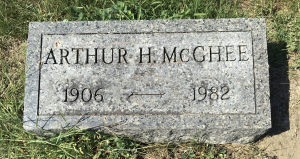
Hello, my grandparents. I drove by the farm before I came here. It took me a while to find it – I finally had to call Mom and Dad from the car because I drove up and down McGhee Hill Road and could not seem to find the driveway. No red barn, no white farmhouse, no sloping green lawn with big trees. Turns out I’d forgotten that you have to go up and over the hill before you get to the farm – it’s on the other side. You’ll be happy to hear that it looks beautiful. They’ve turned the barn into some kind of pottery place, or art studio. Artisanal cheese, maybe. Whoever those New Yorkers you sold it to are, they obviously love the place. Not the way we did, though. No one could love it the way we did, back then.
Dear One Absent This Long While
– Lisa Olstein
It has been so wet stones glaze in moss;
everything blooms coldly.
I expect you. I thought one night it was you
at the base of the drive, you at the foot of the stairs
you in a shiver of light, but each time
leaves in wind revealed themselves,
the retreating shadow of a fox, daybreak.
We expect you, cat and I, bluebirds and I, the stove.
In May we dreamed of wreaths burning on bonfires
over which young men and women leapt.
June efforts quietly.
I’ve planted vegetables along each garden wall
so even if spring continues to disappoint
we can say at least the lettuce loved the rain.
I have new gloves and a new hoe.
I practice eulogies. He was a hawk
with white feathered legs. She had the quiet ribs
of a salamander crossing the old pony post road.
Yours is the name the leaves chatter
at the edge of the unrabbited woods.
For more information on Lisa Olstein, please click here.
Website
Blog
Facebook page
@alisonmcghee







September 17, 2016
Poem of the Week, by Alan Gillis
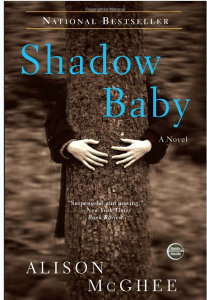 When I was eighteen I left the landscape of my childhood –the foothills of the southwestern Adirondacks, in far upstate New York– for college in Vermont, and in all the years since I have never spent more than a week at a time in my homeland, always to visit my parents. You would think I left that world behind, the day I got to college, and in a way that’s true. The horizons of my life blew wide open that day, and they have kept right on opening. But every adult novel I’ve ever written is set in that land, with its maples and oaks that turn to flame in the autumn, pine trees in winter that look black against deep snow that looks blue or white or pink, depending. The people in those novels aren’t real, I conjured them up out of my heart and my head, but I wish they had been around when I was a girl. Maybe I would’ve loved them, maybe they would’ve loved me. When Alan Gillis in this beautiful, dreamlike poem below talks about the girl who sheds the skin of her longing only to escape into more longing, I know in my bones what he means. I guess everyone does.
When I was eighteen I left the landscape of my childhood –the foothills of the southwestern Adirondacks, in far upstate New York– for college in Vermont, and in all the years since I have never spent more than a week at a time in my homeland, always to visit my parents. You would think I left that world behind, the day I got to college, and in a way that’s true. The horizons of my life blew wide open that day, and they have kept right on opening. But every adult novel I’ve ever written is set in that land, with its maples and oaks that turn to flame in the autumn, pine trees in winter that look black against deep snow that looks blue or white or pink, depending. The people in those novels aren’t real, I conjured them up out of my heart and my head, but I wish they had been around when I was a girl. Maybe I would’ve loved them, maybe they would’ve loved me. When Alan Gillis in this beautiful, dreamlike poem below talks about the girl who sheds the skin of her longing only to escape into more longing, I know in my bones what he means. I guess everyone does.
To Be Young and in Love in Middle Ireland
– Alan Gillis
The girl from the satellite
town holds berries in the fast stream
supermarket queue.
She carries her longing like a stream of song,
her melody
a body over the boundary
of what is solid and what flows.
The guys in the depression-
hit town are tripping in the fruit
aisle. Falling for her
berry lightness they slip out
from their outlines. One guy says
she takes the form of a dream,
or the dream of a form.
On the page of the regional
night berries
pulse like the notes of a song
in the stream. The girl
who sheds the skin of her longing
escapes into more
longing.
In a dream on the margins
of town one of the guys
hears a girl sing, her voice
like strings,
a basket of ripe berries
floating into the night
on a stream.
The girl, the guy, in derelict
bedrooms hear lucent songs
undressing,
streaming from their outlines
through the boundaries
of town wrapping around them
the scent of fresh berries.
And I was the guy and the girl
was within
the page of the town
ever, over, after, never, the song
long, long, long, long.
The stream is slipped as the ground
you stand on.
Build houses out of song.
The berries are undressing.
The stream is long, gone, long.
The girl dreams a form of dream,
or forms a dream of form:
the boundaries of song in the night
undressed as a stream in the morning.
For more information on Alan Gillis, please click here.
Website
Blog
Facebook page
@alisonmcghee







September 10, 2016
Poem of the Week, by Dorianne Laux

That little phrase above there, “changjiang shangyou hen feiwo,” is one of my favorite sentences in the world. It translates as “the upper reaches of the Yangtze River valley are very rich and fertile” which is all well and good, but what I love about it is the way it sounds when you say it. The upward swoop of the chang, the sustained note of the jiang, the downward bark of the shang and the swing of the you, the deep growl of the you, and the swift up and down finish of the feiwo. Mandarin is a language I speak to myself inside my own head. It’s part of the language of words themselves, the sound and feel of them, phrases and fragments and little mantras that in my life others have used to soothe, like All shall be well, and all shall be well, and all manner of things shall be well. All the good words that save us, that have saved us.
Tonight I Am in Love
Dorianne Laux
Tonight, I am in love with poetry,
with the good words that saved me,
with the men and women who
uncapped their pens and laid the ink
on the blank canvas of the page.
I am shameless in my love; their faces
rising on the smoke and dust at the end
of day, their sullen eyes and crusty hearts,
the murky serum now turned to chalk
along the gone cords of their spines.
I’m reciting the first anonymous lines
that broke night’s thin shell: sonne under wode.
A baby is born us bliss to bring. I have labored
sore and suffered death. Jesus’ wounds so wide.
I am wounded with tenderness for all who labored
in dim rooms with their handful of words,
battering their full hearts against the moon.
They flee from me that sometime did me seek.
Wake, now my love, awake: for it is time.
For God’s sake hold your tongue and let me love!
What can I do but love them? Sore throated
they call from beneath blankets of grass,
through the windtorn elms, near the river’s
edge, voices shorn of everything but the one
hope, the last question, the first loss, calling
Slow, slow, fresh fount, keep time with my salt tears.
When as in silks my Julia goes, calling Why do I
languish thus, drooping and dull as if I were all earth?
Now they are bones, the sweet ones who once
considered a cat, a nightingale, a hare, a lamb,
a fly, who saw a Tyger burning, who passed
five summers and five long winters, passed them
and saved them and gave them away in poems.
They could not have known how I would love them,
worlds fallen from their mortal fingers.
When I cannot see to read or walk alone
along the slough, I will hear you, I will
bring the longing in your voices to rest
against my old, tired heart and call you back.







August 27, 2016
Poem of the Week, by Lisel Mueller
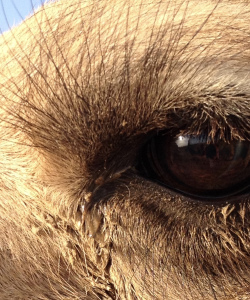 Long ago, only fifteen years after they were first discovered by farmers digging a well near Xian, I went to see the terracotta warriors. The memory haunts me. The place wasn’t well organized back then – you sort of stumbled around and then down into the ground, where the clay soldiers, thousands of them, stood at attention. Signs: “No spitting. No taking pictures. No taking artifacts.” The guy we had hired to drive us out to the site bent down at one point and scraped up some clay dust and dropped it right into my pocket. No taking artifacts, I whispered to him, and he shrugged and laughed and said, Now you’ve got some 10,000 year old dirt to take back to America. It was the soldiers that haunt me, though. Their faces, their bodies, their height and weight, the breadth of their shoulders: All different, like looking at an army of real men frozen in time. I stood looking at them, wondering about their lives. This poem by Lisel Mueller makes me remember them all over again.
Long ago, only fifteen years after they were first discovered by farmers digging a well near Xian, I went to see the terracotta warriors. The memory haunts me. The place wasn’t well organized back then – you sort of stumbled around and then down into the ground, where the clay soldiers, thousands of them, stood at attention. Signs: “No spitting. No taking pictures. No taking artifacts.” The guy we had hired to drive us out to the site bent down at one point and scraped up some clay dust and dropped it right into my pocket. No taking artifacts, I whispered to him, and he shrugged and laughed and said, Now you’ve got some 10,000 year old dirt to take back to America. It was the soldiers that haunt me, though. Their faces, their bodies, their height and weight, the breadth of their shoulders: All different, like looking at an army of real men frozen in time. I stood looking at them, wondering about their lives. This poem by Lisel Mueller makes me remember them all over again.
Immortality
– Lisel Mueller
In Sleeping Beauty’s castle
the clock strikes one hundred years
and the girl in the tower returns to the
world.
So do the servants in the kitchen,
who don’t even rub their eyes.
The cook’s right hand, lifted
an exact century ago,
completes its downward arc
to the kitchen boy’s left ear;
the boy’s tensed vocal cords
finally let go
the trapped, enduring whimper,
and the fly, arrested mid-plunge
above the strawberry pie,
fulfills its abiding mission
and dives into the sweet, red glaze.
As a child I had a book
with a picture of that scene.
I was too young to notice
how fear persists, and how
the anger that causes fear persists,
that its trajectory can’t be changed
or broken, only interrupted.
My attention was on the fly;
that this slight body
with its transparent wings
and lifespan of one human day
still craved its particular share
of sweetness, a century later.
For more information on Lisel Mueller, please click here.
Website
Blog
Facebook page
@alisonmcghee







August 20, 2016
Poem of the Week, by Major Jackson
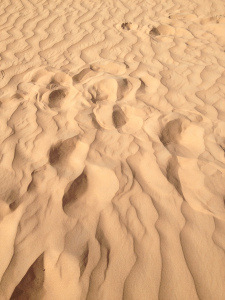 Walking Man was someone I first noticed many years ago because he walked as fast as me (apparently I walk with great purpose), and he seemed to walk all day long, every day of the year, tromping the lakes and streets of our southwest Minneapolis neighborhood. He was a strong, well-built, handsome man. In summer he wore shorts and a t-shirt, in winter jeans and a parka. One time only has Walking Man returned my hello; his eyes are usually fixed on a far horizon. Once, about fifteen years in, I passed a man sitting on a bench on Lake Calhoun and did a double-take. Was that Walking Man? Sitting? Yes. The first time I ever saw him not in motion. Two days ago an old man in jeans and a t-shirt came toward me on Lake Street: extreme bowlegs, a mane of flowing white hair, a rocking gait that hurt to witness, so painful did it look. I watched that old man lurch toward me, hoped he didn’t have far to walk, wondered if I could help. Then I realized who it was.
Walking Man was someone I first noticed many years ago because he walked as fast as me (apparently I walk with great purpose), and he seemed to walk all day long, every day of the year, tromping the lakes and streets of our southwest Minneapolis neighborhood. He was a strong, well-built, handsome man. In summer he wore shorts and a t-shirt, in winter jeans and a parka. One time only has Walking Man returned my hello; his eyes are usually fixed on a far horizon. Once, about fifteen years in, I passed a man sitting on a bench on Lake Calhoun and did a double-take. Was that Walking Man? Sitting? Yes. The first time I ever saw him not in motion. Two days ago an old man in jeans and a t-shirt came toward me on Lake Street: extreme bowlegs, a mane of flowing white hair, a rocking gait that hurt to witness, so painful did it look. I watched that old man lurch toward me, hoped he didn’t have far to walk, wondered if I could help. Then I realized who it was.
How to Listen
– Major Jackson
I am going to cock my head tonight like a dog
in front of McGlinchy’s Tavern on Locust;
I am going to stand beside the man who works all day combing
his thatch of gray hair corkscrewed in every direction.
I am going to pay attention to our lives
unraveling between the forks of his fine-tooth comb.
For once, we won’t talk about the end of the world
or Vietnam or his exquisite paper shoes.
For once, I am going to ignore the profanity and
the dancing and the jukebox so I can hear his head crackle
beneath the sky’s stretch of faint stars.
For more information on Major Jackson, please click here.
Website
Blog
Facebook page
@alisonmcghee







August 14, 2016
Poem of the Week, by Ocean Vuong
 A few months ago I began reading poems by Ocean Vuong, at first because his name, Ocean, enchanted me and then because his poems enchanted me. I have read the one below many times now, and each time, that opening line —Ocean, don’t be afraid– brings a lump to my throat. (How many times I have told myself Be brave, Alison, don’t live a fearful life.) The title, Someday I’ll Love Ocean Vuong, hits me in the same gut-punch way. This is one of those poems which I can’t sum up in a “What’s it about” kind of way, but because my heart responds to it in a below-the-surface way, I don’t need to. Months after I first discovered his work, I learned that Ocean Vuong thinks and writes in intricate English while communicating with his family in elementary Vietnamese, that he saved every penny he could from awards and publications for a down payment on a house for his family, and that his mother found it unfathomable that words –spun out from her son’s head and sent around the world in print and on youtube– could result in something tangible: a key to a house they could call their own. A poem borne of so many threads, so many years, so many tides and currents.
A few months ago I began reading poems by Ocean Vuong, at first because his name, Ocean, enchanted me and then because his poems enchanted me. I have read the one below many times now, and each time, that opening line —Ocean, don’t be afraid– brings a lump to my throat. (How many times I have told myself Be brave, Alison, don’t live a fearful life.) The title, Someday I’ll Love Ocean Vuong, hits me in the same gut-punch way. This is one of those poems which I can’t sum up in a “What’s it about” kind of way, but because my heart responds to it in a below-the-surface way, I don’t need to. Months after I first discovered his work, I learned that Ocean Vuong thinks and writes in intricate English while communicating with his family in elementary Vietnamese, that he saved every penny he could from awards and publications for a down payment on a house for his family, and that his mother found it unfathomable that words –spun out from her son’s head and sent around the world in print and on youtube– could result in something tangible: a key to a house they could call their own. A poem borne of so many threads, so many years, so many tides and currents.
Someday I’ll Love Ocean Vuong
– Ocean Vuong
Ocean, don’t be afraid.
The end of the road is so far ahead
it is already behind us.
Don’t worry.
Your father is only your father
until one of you forgets. Like how the spine
won’t remember its wings
no matter how many times our knees
kiss the pavement. Ocean,
are you listening? The most beautiful part
of your body is wherever
your mother’s shadow falls.
Here’s the house with childhood
whittled down to a single red tripwire.
Don’t worry. Just call it horizon
& you’ll never reach it.
Here’s today. Jump. I promise it’s not
a lifeboat. Here’s the man
whose arms are wide enough to gather
your leaving. & here the moment,
just after the lights go out, when you can still see
the faint torch between his legs.
How you use it again & again
to find your own hands.
You asked for a second chance
& are given a mouth to empty into.
Don’t be afraid, the gunfire
is only the sound of people
trying to live a little longer. Ocean. Ocean,
get up. The most beautiful part of your body
is where it’s headed. & remember,
loneliness is still time spent
with the world. Here’s the room with everyone in it.
Your dead friends passing
through you like wind
through a wind chime. Here’s a desk
with the gimp leg & a brick
to make it last. Yes, here’s a room
so warm & blood-close,
I swear, you will wake—& mistake these walls
for skin.
For a fascinating and beautiful interview with Ocean Vuong, please click here.
Website
Blog
Facebook page
@alisonmcghee







August 7, 2016
Poem of the Week, by Stephen Dunn
 I’m teaching a Creative Writing Boot Camp this week. Six days in a row, seven hours a day, nineteen of us gather in a windowed classroom halfway between Minneapolis and St. Paul to write and write and talk and talk about the art and craft and act of writing. Poems and tiny short stories, tiny memoirs. Beautiful, painful, funny, wistful fragments of life, captured on paper and released into the invisible air of the room. I could teach for another fifty years and never lose this astonishment, that nurses and truck drivers and musicians and stay at home parents and hair stylists and sex workers and clerks and commodities traders and group home workers, Muslim and Christian and atheist, come together in a single small room and transform themselves and me and the whole outside world by the power of sharing stories. If a teacher asked me to name a sacred place, the classroom would be mine.
I’m teaching a Creative Writing Boot Camp this week. Six days in a row, seven hours a day, nineteen of us gather in a windowed classroom halfway between Minneapolis and St. Paul to write and write and talk and talk about the art and craft and act of writing. Poems and tiny short stories, tiny memoirs. Beautiful, painful, funny, wistful fragments of life, captured on paper and released into the invisible air of the room. I could teach for another fifty years and never lose this astonishment, that nurses and truck drivers and musicians and stay at home parents and hair stylists and sex workers and clerks and commodities traders and group home workers, Muslim and Christian and atheist, come together in a single small room and transform themselves and me and the whole outside world by the power of sharing stories. If a teacher asked me to name a sacred place, the classroom would be mine.
The Sacred
– Stephen Dunn
After the teacher asked if anyone had
a sacred place
and the students fidgeted and shrank
in their chairs, the most serious of them all
said it was his car,
being in it alone, his tape deck playing
things he’d chosen, and others knew the truth
had been spoken
and began speaking about their rooms,
their hiding places, but the car kept coming up,
the car in motion,
music filling it, and sometimes one other person
who understood the bright altar of the dashboard
and how far away
a car could take him from the need
to speak, or to answer, the key
in having a key
and putting it in, and going.
For more information about Stephen Dunn, please click here.
Website
Blog
Facebook page
@alisonmcghee







July 31, 2016
Poem of the Week, by Joyce Sutphen
 Last month I was in the foothills of the Adirondacks, poking around my parents’ giant vegetable garden (the thing could supply a small farmer’s market) talking tomatoes and beans with my father. Every summer and fall growing up we had an assembly line in the kitchen, washing and chopping and blanching and bagging zucchini and corn and beans and all kinds of squash for the freezer. Like most of the men I grew up around, my father always wears a hat (cap for everyday, hat-hat for solemn occasions), goes to the diner every morning, knows how to drive a tractor and change its oil, and has spent his life working hard and helping his neighbors and voting in elections. Joyce Sutphen’s elegant, fierce poems bring me back to my childhood. Some of them, like this one below, bring me to tears.
Last month I was in the foothills of the Adirondacks, poking around my parents’ giant vegetable garden (the thing could supply a small farmer’s market) talking tomatoes and beans with my father. Every summer and fall growing up we had an assembly line in the kitchen, washing and chopping and blanching and bagging zucchini and corn and beans and all kinds of squash for the freezer. Like most of the men I grew up around, my father always wears a hat (cap for everyday, hat-hat for solemn occasions), goes to the diner every morning, knows how to drive a tractor and change its oil, and has spent his life working hard and helping his neighbors and voting in elections. Joyce Sutphen’s elegant, fierce poems bring me back to my childhood. Some of them, like this one below, bring me to tears.
Our Fathers
– Joyce Sutphen
Our fathers, who lived all their lives on earth—
are going now. They have given us all
we need, and when we asked, they gave us more.
Their names are beautiful to us, holy
as the names of stars, as familiar
as the roads we traveled, falling asleep
on the way from one farm to another.
Their kingdoms were small; they were never
interested in more than one homestead,
and as for evil: although they could not
keep it from us, they tried to keep us from
temptation, though we were like all children
and wanted our own power and glory,
world without end, forever and amen.
For more information on Joyce Sutphen, please click here.
Website
Blog
Facebook page
@alisonmcghee







July 23, 2016
Poem of the Week, by Jim Harrison

Larger than life wilderness hunter fisher beautiful women drop at my feet gunslinger writing got old for me a long time ago. When I come across it I think, Oh come on. Tell me what’s really going on in there, behind the bluster and the swagger and the macho. Tell me how you feel about your child, or what you think about when you think about leaving this world. Which is why I so love this poem, by the larger than life Mr. Harrison, who died this past March.
Debtors
– Jim Harrison
They used to say we’re living on borrowed
time but even when young I wondered
who loaned it to us? In 1948 one grandpa
died stretched tight in a misty oxygen tent,
his four sons gathered, his papery hand
grasping mine. Only a week before, we were fishing.
Now the four sons have all run out of borrowed time
while I’m alive wondering whom I owe
for this indisputable gift of existence.
Of course time is running out.
It always has been a creek heading east, the freight
of water with its surprising heaviness
following the slant of the land, its destiny.
What is lovelier than a creek or riverine thicket?
Say it is an unknown benefactor who gave us
birds and Mozart, the mystery of trees and water
and all living things borrowing time.
Would I still love the creek if I lasted forever?
For more information on Jim Harrison, please click here.
Website
Blog
Facebook page
@alisonmcghee










